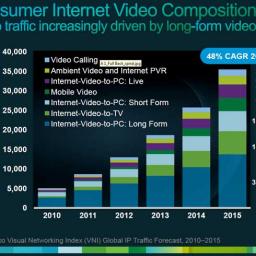With just one day remaining before tiny Tennessee-based electric co-op Duck River claimed it would rip Comcast's equipment and wiring off its utility poles for non-payment of pole attachment fees, Comcast showed up with a check. Had Comcast not come up with a payment, Duck River was prepared to start removing Comcast's wiring and equipment from its poles, and cut power to Comcast's equipment, which would have
killed service for about 7,000 Comcast customers.
Comcast claims Duck River is using their position as a monopoly to gouge customers with high rates. Duck River officials dispute that and say Comcast was behind (again) on its pole attachment fee payments and is the only utility company complaining about the price. "If you don't pay your Comcast cable TV or internet bill, they're going to do what?" The answer, said Steve Oden, director of member services at Duck River, is they "cut you off." The two are now talking (again) about securing a long-term contract that will stabilize pole attachment rates and keep Duck River's local power co-op from having to make collection calls in the future.
If you thought your Internet service was slow, consider being a customer of Cincinnati Bell's 75 baud Telegraph Grade service, on offer to subscribers since the 1800s for low-speed stock quotes, telegrams, and office-to-home communications. But don't consider it too long, because the service is about to be discontinued.
Remarkably, Cincinnati Bell still needs the permission of regulators to drop the Civil War era telegraph service and reminded regulators the change will have no impact on the "public convenience and necessity" because there have been no customers for the service for a long time. Cincinnati Bell's request would have gone unnoticed if it wasn't for the long legacy of the telegraph era. Western Union dispatched its last telegram on Jan. 27, 2006, after 155 years of continuous service, and largely kept quiet about it.
Those nostalgic for telegrams might be interested to know another company has risen where Western Union left off. iTelegram promises to bring back the experience of a messenger at your front door, but it's a costly trip down Memory Lane. A Priority Telegram costs $28.95 + $0.75 per word and is delivered usually within 24 hours, and includes proof of delivery. Or you could send an e-mail for approximately nothing.
http://stopthecap.com/2016/03/22/cincinnati-bell-plans-shutdown-telegraph-grade-service-offer-since-1800s/The epicenter of internet construction nightmares for homeowners is on Lambs Lane in Southeast Austin, where last October a flash flood allegedly caused by Google's construction crews blocking nearby storm drains brought two feet of water into the home of Arnulfo and Dolores Cruz, causing $100,000 in damages. Hundreds of other complaints cite yard and property damage, trespassing, and construction vehicles blocking access to driveways.
Residents cannot get compensation until they find out which of a litany of contractors and subcontractors working in the area dumped giant piles of dirt on their front lawns, dug open holes or trenches and left them uncovered, or used their yards to store construction equipment and supplies without permission. With Google, AT&T, and Time Warner Cable all upgrading infrastructure, it is difficult to determine who is responsible for what. That makes assigning responsibility for damages very difficult. In some neighborhoods, electric and water lines were severed by construction crews as well. Some residents have even resorted to calling police when crews trespass repeatedly on private property without the courtesy of prior notification or identification.
http://stopthecap.com/2016/03/01/google-fibers-contractors-create-headaches-austin-residents/Amazon.com has raised the free shipping minimum to $49 from $35 for non-Prime members, according to information provided on the Amazon website. The company hasn't published a press release with the news. For books, the threshold is still $25.
There is unlimited free two-day shipping for Prime members. "A higher minimum order requirement for free non-Prime shipping effectively increases the appeal of Prime membership, and Prime households spend disproportionately more than non-Prime households." A steep 32.8% increase in fulfillment costs had a negative impact on quarterly earnings announced on January 29. Prime membership increased 51% in 2015.
http://www.marketwatch.com/story/amazon-ups-free-shipping-minimum-to-49-from-35-for-non-prime-members-2016-02-22
Four years ago an Australian reporter for the ABC network wrote an article detailing why the
proposed plan by the Liberal Coalition would not work. Now we can see the costs and problems with the "mixed mode" plan where multiple technologies are used for the NBN instead of fiber to the premises (FPPT) it is clear that the predictions made by Nick Ross in June 2012 were correct. From a technical and monetary perspective the problem is very simple; deploying any technology less than the highest option available will cost more in the long run as the inferior technology will eventually have to be pulled out and replaced. The Australian government is now
covering up the data proving this with
researchers reporting that the FTTP would easily be better value than FTTN. Elsewhere, other
significance of NBN report by Nick Ross is still being debated with
accusations against the ABC for gagging coming to light. The future of Australian business commerce depends on having a stable fast reliable internet infrastructure with broadband connectivity for all Australians. The only question is: when will they get it?
More information here.
 The UK government estimates it will cost 175m
The UK government estimates it will cost 175m ($266m USD) a year to collect and store metadata, while ISP's
are warning that the costs could be far higher, with 15TB passing over an average connection per year. Under the bill, providers would be required to store metadata for at least 12 months.
While many people now use a VPN which can help avoid metadata collection, everyone will have to pay an internet tax in the future to meet the costs of their government tracking their internet usage, even though collecting this data for VPN users is mostly pointless. "The indiscriminate collection of mass data is going to have a massive cost",
says Matthew Hare of ISP Gigaclear.
Li-Fi is a new method of delivering data. It uses the visible spectrum rather than radio waves. For the first time, this new technology has been tested in a working office. Li-Fi is a wireless technology that transmits high-speed data using visible light communication. The Li-Fi system uses standard light-emitting diodes (LEDs) to transmit electronic data signals, which will enable users to access the internet through the ordinary lighting systems in schools, workplaces and homes.
With scientists achieving speeds of 224 gigabits per second in the lab using Li-Fi earlier this year, the potential for this technology is huge. And now, scientists have taken Li-Fi out of the lab for the first time, trialling it in offices and industrial environments in Tallinn, Estonia, reporting that they can achieve data transmission at 1 GB per second - that's 100 times faster than current average Wi-Fi speeds.
The technology uses Visible Light Communication (VLC), a medium that uses visible light between 400 and 800 terahertz (THz). It works basically like an incredibly advanced form of Morse code - just like switching a torch on and off according to a certain pattern can relay a secret message, flicking an LED on and off at extreme speeds can be used to write and transmit things in binary code. The flickering of light is too fast for humans to notice.
http://www.bbc.com/news/technology-34942685"After the recent Paris terror attacks, the French government is proposing to forbid and block the use of the Tor anonymity network, according to an internal document from the Ministry of Interior seen by French newspaper Le Monde.
That document lays out two proposed pieces of legislation, one around the state of emergency, and the other concerning counter-terrorism.
In the former, the French government is considering to "Forbid free and shared wi-fi connections" during a state of emergency. This comes from a police opinion included in the document: the reason being that it is apparently difficult to track individuals who use public wi-fi networks.
The latter piece of legislation, meanwhile, says the government is considering "to block or forbid communications of the Tor network." The legislation, according to Le Monde, could be presented as early as January 2016."
-
http://motherboard.vice.com/read/after-paris-attacks-proposed-french-law-would-block-tor-and-forbid-free-wi-fiVerizon Communications Inc is exploring a sale of its enterprise assets which could be worth as much as $10 billion. The sale would include the business formerly known as MCI (acquired in 2006), which provides landline and Internet services for large business customers, as well as Terremark (acquired in 2011), its data center unit. The assets have estimated annual earnings of around $2 billion. The businesses have struggled to keep up with advances in cloud computing, and face fierce price competition from players such as Google and Amazon. Verizon is still considering how some of these asset sales could best be structured and no deal is imminent.
Wireline provider CenturyLink Inc was in talks with Verizon earlier this year to buy some of the assets but could not agree on terms. In a strategy shift, CenturyLink announced this week it would instead explore options for its data centers, including possibly selling them. The enterprise telecommunications industry has had to adapt in recent years to corporate customers seeking more sophisticated and cheaper offerings to manage their data. AT&T Inc has been exploring a sale of its data center assets for some time, while Windstream Holdings Inc sold its data center business for $575 million to TierPoint last month.
Verizon Chief Financial Officer Fran Shammo said, during the company's third-quarter earnings call on Oct. 20, that it continues "to work through secular and economic challenges" with its global enterprise division, which posted a 4.9 percent decline in revenue in the quarter ended Sept. 30. Verizon has been looking to sell other non-core assets as well. In February, it announced the sale of residential landline assets in California, Texas and Florida to Frontier Communications for $10.54 billion, and unloaded its tower portfolio for more than $5 billion.
http://www.reuters.com/article/2015/11/06/us-verizonenterprise-m-a-idUSKCN0SV2HE20151106
There are a growing number of toll roads on the information superhighway. There are now more countries with a heavily censored Internet than there are ones with a completely free Internet.
Worst among the 65 countries assessed is China, which also happens to be the country with the largest number of internet users (641 million). Thanks to a new law passed last month, Chinese internet users are now even more vulnerable to criminal charges if they are found to be spreading "rumors" or politically delicate information online.
In the United States, President Barack Obama advocated for an open internet earlier this year. But the US takes the fifth spot after Iceland, Estonia, Canada, and Germany.
As more and more countries follow China's example and clamp down online, a great ideal of the Internet seems to be on the decline, if not already lost. "The future contours of the Internet are definitely up for grabs," says Crawford.
"Very interesting countries hang in the balance, like India, where 1.2 billion people could be online - only about a quarter of them are right now," she says. "Cuba is just coming online, and so is much of Africa. Who are they going to follow? My hope is that they look to the United States, Australia, Canada, and the EUas a model of openness. Not just for economic purposes, but for the thriving of human beings."
http://www.pri.org/stories/2015-11-03/future-internet-place-open-exchange-ideas-very-much-air

